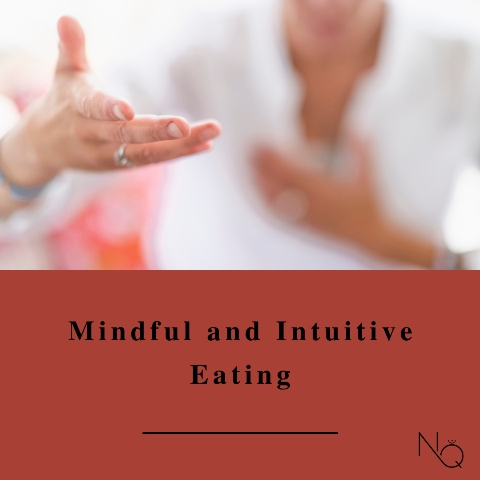What is mindful eating?
Mindful eating is a term that describes the action of consciously choosing the food we want to consume. To do this, we need to learn to distinguish hunger and cravings, to identify the signs of satiety - that is, when we are full- and the differences between physical and psychological hunger. Being aware of the present -the moment we eat or want to eat - and paying attention to the effect of food and our sensations when we eat are characteristics of mindful eating.
What is intuitive eating?
Intuitive eating is an alternative way to manage body weight that differs from typical diet programs. More specifically, intuitive eating trains individuals to have an open, non-judgmental, and indulgent attitude toward nutrition. Intuitive eating has things in common with mindful eating, though it rejects diet culture, the claim that there is good and bad food, and encourages us to honor hunger and allow ourselves to eat. Intuitive eating does not involve meditation.
Key research findings on mindful/intuitive eating
Mindfulness-based approaches are more effective in dealing with binge eating, emotional eating, and eating in response to external stimuli. There is a lack of evidence on whether mindful eating is effective in managing weight, but it can prevent weight gain. An online study investigated in Pakistan linked mindful eating to mental well-being. As for intuitive eating, studies show it may link to a lower Body Mass Index (BMI), better body image, and a better relationship with food.
Mechanisms behind mindful/intuitive eating
The mechanisms of action of mindful/intuitive eating are not yet fully understood. Learning to bring our experiences to a conscious level and recognize our mental discomfort helps us stop operating automatically. So instead of reacting without thinking about a situation or feeling and automatically eating, we become aware of what is happening and make a conscious choice. Research that used MRIs of people who have followed mindful/intuitive eating has revealed changes in parts of the brain associated with processing emotions, indicating an alteration in our response to stimuli.
Who can follow mindful/intuitive eating?
Mindful/intuitive eating is very effective in people with obesity and related behaviors (like eating after an external stimulus such as the smell or image of food, emotional eating, intense cravings, e.t.c.) or eating disorders. Normal-weight people can also benefit a lot from this diet. In general, mindful/intuitive eating can improve our relationship with food.
Who better not follow mindful/intuitive eating?
Mindful/intuitive eating can be followed by anyone as long as metabolic imbalances are regulated. For example, a person with uncontrolled diabetes is likely to have hunger pangs due to hypoglycemia, so introducing them to mindful/intuitive eating will not pay off if we have an unresolved problem. At the same time, people dealing with a clinical issue or are athletes may benefit more from a precise nutritional plan than from counseling sessions focused on mindful eating. In these cases, a structured nutrition plan to achieve specific health and athletic performance goals is significant. It is vital to evaluate together what would best suit each person.
How does one get started with mindful/intuitive eating?
Some examples summarizing the principles of mindful/intuitive eating are below, so anyone can start thinking and reflecting on this. Of course, the best approach is with the help of a dietitian, so mindful/intuitive eating is personalized, change can be made in-depth, and we can avoid misinterpretations of this way of eating.
• I want to eat. Am I hungry or craving?
• How do I feel right now? Am I tired/stressed/upset, so I ask for food?
• Have I satisfied my thirst before eating?
• Am I full? How do I understand my feeling of satiety?
• It is ok to want to eat salad when I want to.
• It is ok to want to eat sweets when I want them.
• It is ok to listen to and serve my body's needs.
• Food is abundant around me. I can choose what I want, whenever I want.
• It is ok to refuse the treat offered to me.
Sources
Warren, J. et al, “A structured literature review on the role of mindfulness, mindful eating, and intuitive eating in changing eating behaviors: effectiveness and associated potential mechanisms”, Nutr Res Rev. 2017 Dec;30(2):272-283.




